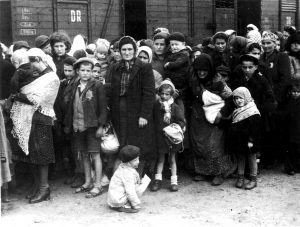Ron Chernow The Warburgs from Delancey Place:
 In 1933, with Hitler and the Nazis boycotting Jewish businesses, many powerful Jews in Germany and the powerful American Jewish charities opposed retaliation, advocating negotiation instead. Some viewed Hitler as a “weak man” and wanted to “strengthen his hand”: “Once the Nazis had cleansed Germany of opposition parties and ended parliamentary government, they turned their attention to the Jews. By mid-March, the rank-and-file were storming department stores and demanding a boycott of Jewish businesses. As much to guide as to incite these volatile emotions. Hitler and Goebbels championed the idea of a boycott. In a March 27 radio broadcast, the government announced that on the morning of April 1st, at the stroke of ten, SA and SS members would take up positions outside Jewish stores and warn the public not to enter. This offense was portrayed as a defensive measure against ‘Jewish atrocity propaganda abroad.’ To add further terror, Göring told Jewish community leaders that they would be held responsible for any anti-German propaganda appearing abroad. Eager to create jobs through exports, Hitler wanted to minimize adverse publicity overseas.
In 1933, with Hitler and the Nazis boycotting Jewish businesses, many powerful Jews in Germany and the powerful American Jewish charities opposed retaliation, advocating negotiation instead. Some viewed Hitler as a “weak man” and wanted to “strengthen his hand”: “Once the Nazis had cleansed Germany of opposition parties and ended parliamentary government, they turned their attention to the Jews. By mid-March, the rank-and-file were storming department stores and demanding a boycott of Jewish businesses. As much to guide as to incite these volatile emotions. Hitler and Goebbels championed the idea of a boycott. In a March 27 radio broadcast, the government announced that on the morning of April 1st, at the stroke of ten, SA and SS members would take up positions outside Jewish stores and warn the public not to enter. This offense was portrayed as a defensive measure against ‘Jewish atrocity propaganda abroad.’ To add further terror, Göring told Jewish community leaders that they would be held responsible for any anti-German propaganda appearing abroad. Eager to create jobs through exports, Hitler wanted to minimize adverse publicity overseas.
“In reacting to the boycott, a split was immediately apparent between foreign Jewish groups who wished to fight and German Jews who wished to negotiate. The latter feared that foreign protest would only seem to confirm the notion of a world Jewish conspiracy inimical to Germany. They also knew that they and not their vocal brethern abroad would feel the stinging lash of reprisals. As a result of their tenuous absorption into German life, the jewish community had always preferred diplomacy and negotiation to public confrontation.
“Overseas Jews labored under no such need to appease the Nazis. The day that the boycott was announced, twenty thousand people crowded into a Madison Square Garden rally in New York to condemn the treatment of German Jews, while another thirty-five thousand milled about the outside. When a counterboycott of German exports was launched, it posed an excruciating dilemma for the American Jewish Committee [charity]. Started by the Jews of German ancestry, the committee feared exposing relatives to reprisals. At the same time, they had to respond to the spontaneous anguish of American Jewry. In the end, the committee opposed the boycott of German goods and tried to halt the Madison Square Garden rally, urging speakers to cancel their appearances. A fatal division sapped ‘International Jewry’ even as the Nazi press claimed that it operated with a single, implacable will.
More here.
